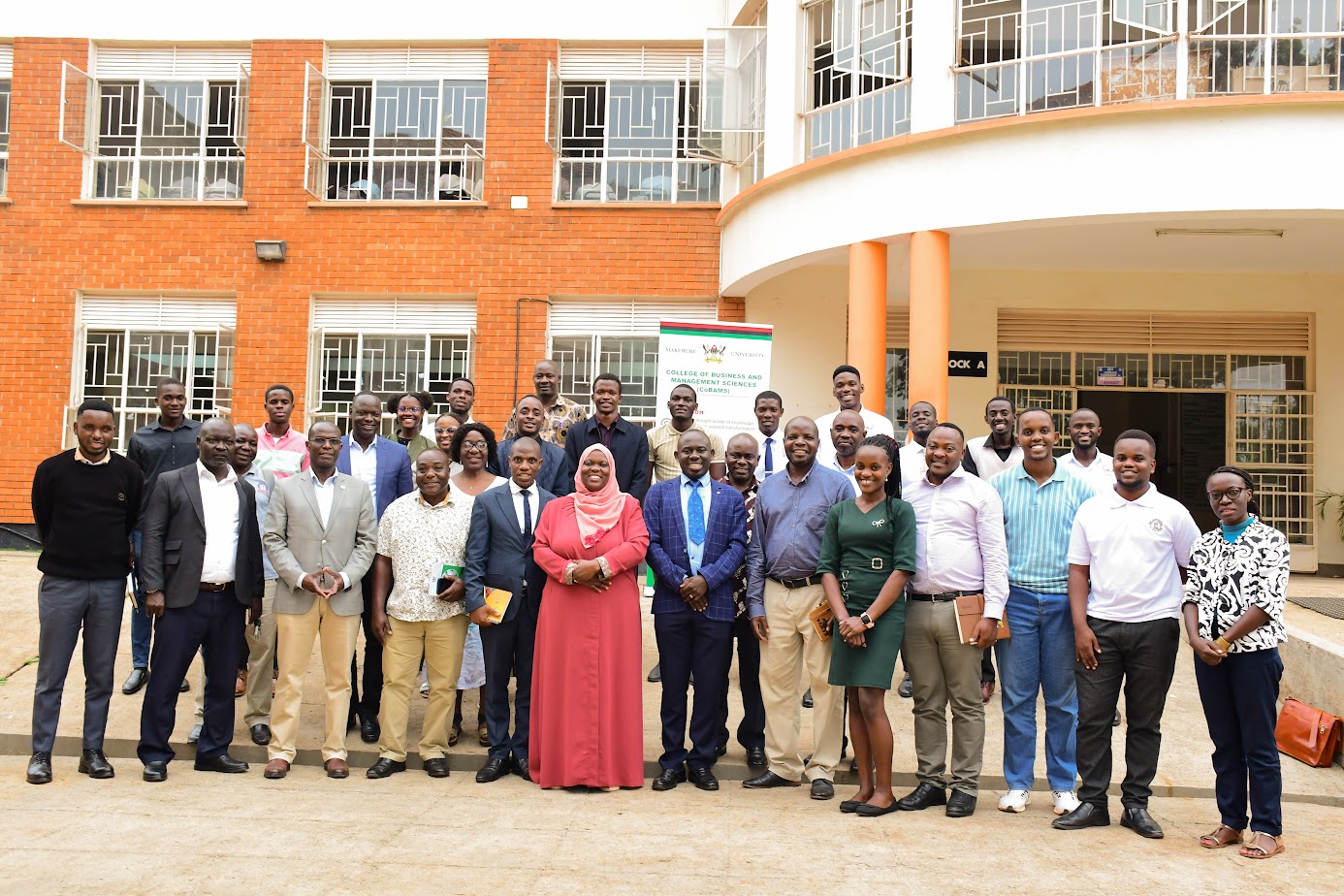On 19th August 2025, the College of Business and Management Sciences (CoBAMS) at Makerere University, hosted a public presentation titled “Africa’s Growth Trends and Prospects in Light of Evolving Global Challenges.”
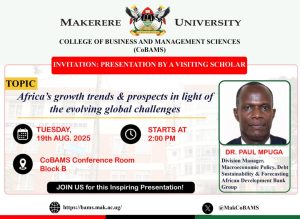
Dr. Paul Mpuga, a visiting Scholar and Division Manager for Microeconomic Policy, Debt Sustainability, and Forecasting in the Economic Governance and Knowledge Management Vice-Presidency of the African Development Bank Group, delivered the presentation, which attracted both physical and virtual participants, comprising researchers, teaching staff, graduate, and undergraduate students.
The presentation covered critical topics including: Regional differences in growth performance and outlook, Inflation in Africa, Opportunities and Challenges to growth, emerging risks, and key policy recommendations.
The presentation provided valuable insights into the current economic challenges and opportunities facing Africa. His analysis highlighted the importance of sound policies, economic integration, and investment in key sectors such as education, infrastructure, and green growth. The discussion emphasized the need for collaboration among governments, the private sector, and academia to drive sustainable development and inclusive growth across the continent.
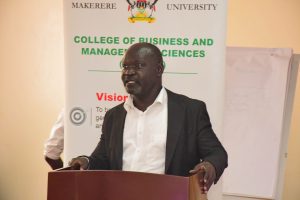
Welcoming the participants, Associate Professor Faisal Buyinza, the Acting Dean of the School of Economics, emphasized that Dr. Mpuga’s work is significant not only for his academic contributions, but also for his role as a mentor, having taught and influenced many of the current faculty members.
“His impressive career journey, which began at the World Bank’s Kampala office and later took him to Ethiopia and other countries, reflects his deep expertise in key economic roles across the continent,” said Associate Professor Buyinza. He disclosed that Dr. Mpuga’s extensive experience has significantly contributed to the development of macroeconomic design and policy skills, an asset particularly crucial as Uganda navigates current economic challenges.
In addition to his professional achievements, the Acting Dean of the School of Economics commended the humanitarian spirit of Dr. Mpuga, recalling how he used to share meals with street children in Uganda, reflecting his compassion and values beyond academia.
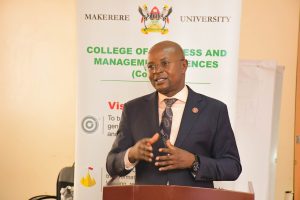
In his address, the College Principal, Prof. Edward Bbaale welcomed Prof. Mpuga back to Makerere University. “Dr. Mpuga is a former Lecturer. Today, he returns to the School of Economics, his academic home, to share with us, his versatile knowledge, experience and expertise on a topic crucial for Africa’s transformation,” said the Principal. He commended Dr. Mpuga’s decision to deliver the presentation, highlighting that such academic engagements are vital and should become a regular part of the College’s culture.
Reiterating the role of knowledge sharing and mentorship within the academic community, the Principal shared his personal testimony, acknowledging Dr. Mpuga’s pivotal role in his own academic journey. He recounted how Dr. Mpuga mentored him early in his career by including his name on a research project—an opportunity that opened doors to numerous collaborations, professional growth, and academic advancement.
The Principal called upon the staff and students present to embrace a culture of regular academic public presentations, such as lunch-hour sessions across the School of Economics, School of Business, and the School of Statistics and Planning. He noted the close connections between the disciplines, highlighting the potential for cross-disciplinary learning and collaboration. The Principal emphasized that as Makerere University implements its research agenda, sustained academic engagement is a key defining aspect of this identity.
Prof. Bbaale affirmed the College’s support for such initiatives, including modest research grants that have already enabled the publication of around 70 research papers, soon to be compiled under the CoBAMS Working Paper Series.
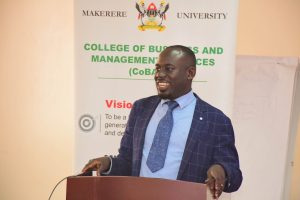
Expressing the commitment to this strategic approach, the College Principal used the opportunity to introduce Dr. Peter Babyenda, a Lecturer at the School of Economics, who was appointed as the College’s Policy Engagement Coordinator to support academic activities. Prof. Bbaale assured all in attendance of the maximum support for this initiative and encouraged active participation from everyone.
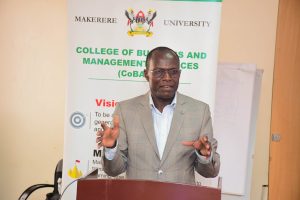
Beginning his presentation, Dr. Paul Mpuga, Division Manager at the African Development Bank, offered a comprehensive overview of Africa’s economic realities, challenges, and opportunities. He emphasized that economic progress is not driven by sentiment, but by certainty, sound policies, and strategic investment.
Using a simple analogy, Dr. Mpuga explained that a baker doesn’t bake bread unless they are sure it will sell. In the same way, investors and entrepreneurs, will only take risks in economies where policy certainty and confidence are assured. He underscored the urgent need for policy coherence and economic stability, both globally and within African nations.
Reiterating the importance of Domestic Revenue Mobilization, Dr. Mpuga noted that Africa’s average tax-to-GDP ratio stands at just 17%—significantly lower than the 25–28% seen in more advanced economies such as South Africa and Botswana. These countries are able to finance up to 90% of their expenditures through domestic revenues, a target that many others on the continent still struggle to achieve.
He underscored the urgent need for reforms in tax systems and public finance management to reduce the over-reliance on external borrowing. “Africa requires an estimated $150–$170 billion annually for infrastructure development, yet currently mobilizes only about $80 billion, leaving a funding gap of $70–$100 billion,” he stated.
Dr. Mpuga emphasized that infrastructure such as roads, energy, water systems, and transport is not a luxury, but a necessity for connecting production to markets and driving sustainable development.
He stated that youth unemployment remains alarmingly high, with 30–40% of African youth (aged 15–34) unemployed in some countries. “Many young people are not in education, employment, or training, leading to wasted talent and increasing social risks,” he highlighted. He emphasized the need for greater investment in skills development and education, noting that sustainable economic transformation depends on a well-equipped and empowered workforce.
Dr. Mpuga pointed out that economic integration and managed migration are strategies that can boost GDP growth, enhance policy stability, and reduce export concentration.
He noted that, despite being one of the regions most affected by climate change, Africa has made limited progress in green growth investments. “The continent is rich in natural resources, yet underutilized in terms of climate-smart development,” he stated.
He indicated a major opportunity gap, when he disclosed that the global green economy is valued at an estimated $3 trillion, but Africa’s private sector participation stands at only 14%.
He advocated for greater private sector involvement, the adoption of green infrastructure practices, and natural capital accounting to help African countries value, protect, and benefit from their resources.
For Africa to realise Inclusive Growth, Dr. Mpuga highlighted the following practical policy recommendations:
- Improving fiscal transparency and efficiency
- Strengthening tax administration using digital tools
- Aligning monetary and fiscal policy, especially around inflation targeting
- Building foreign reserves to cushion against shocks
- Ensuring debt is used for productive investments such as energy and infrastructure
- Accelerating structural reforms and economic diversification
- Promoting integrated infrastructure planning (for instance roads with energy and ICT links)
- Investing in value addition and agro-processing to uplift rural economies
Using a humorous reference to Uganda’s famous grasshopper delicacies, Dr. Mpuga illustrated the need for economic transformation, saying, “We need to move beyond traditional activities and create value chains that can package and export even local foods globally. We shouldn’t be running to donors every day when we sit on so much wealth,” he noted. “Let us value what we have, manage it well, and build a prosperous, united, and green Africa.”
Responding to the questions, Dr. Mpuga emphasized the importance of formalizing economies, strengthening trade links, and building public confidence through sound policy frameworks such as inflation targeting and social contracts. He cautioned against excessive reliance on Artificial Intelligence in academic and professional settings. “AI can be useful for checking work or assisting with calculations, but it cannot replace human thought, creativity, or critical reasoning,” he advised.
Dr. Mpuga mentioned the need for better monitoring and maintenance systems, such as ensuring broken streetlights are tracked and fixed, drawing attention to practical governance concerns that affect everyday life.
Monica Meeme contributed to this story as a Guest Writer

